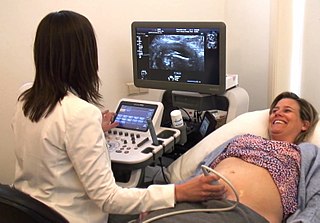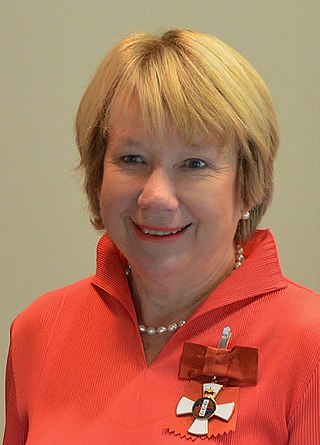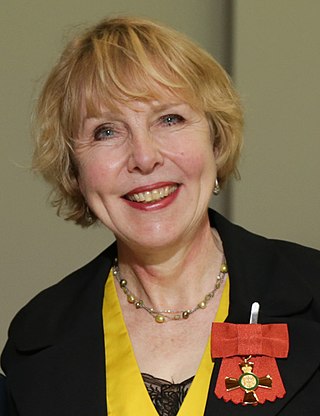
Midwifery is the health science and health profession that deals with pregnancy, childbirth, and the postpartum period, in addition to the sexual and reproductive health of women throughout their lives. In many countries, midwifery is a medical profession. A professional in midwifery is known as a midwife.
A home birth is a birth that takes place in a residence rather than in a hospital or a birthing center. They may be attended by a midwife, or lay attendant with experience in managing home births. Home birth was, until the advent of modern medicine, the de facto method of delivery. The term was coined in the middle of the 19th century as births began to take place in hospitals.

A midwife is a health professional who cares for mothers and newborns around childbirth, a specialization known as midwifery.

Dame Judith Helen McGregor is a New Zealand lawyer, journalist, public servant and academic. She is currently a full professor at Auckland University of Technology and chairs the Waitematā District Health Board.

Lesley Margaret Elizabeth McCowan is a New Zealand medical researcher and academic specialising in maternal health. She is currently a full professor and head of obstetrics and gynaecology at the University of Auckland.

Edith Marion Jones is a New Zealand nursing academic. As of September 2018 she is a full professor at the Auckland University of Technology.
Hinematau Naomi McNeill is a New Zealand academic and treaty negotiator. She is of Tapuika Māori descent. As of 2019, she is a full professor at the Auckland University of Technology.
Margaret (Maggie) Fraser Myles, née Findlay, was a Scottish midwife, midwifery tutor and lecturer and author. She is globally known for her Textbook for Midwives, first published in 1953, which has been considered a reference midwifery textbook for decades.

The St Helens Hospitals were maternity hospitals located in seven New Zealand cities. They were the first state-run maternity hospitals in the world offering both midwifery services and midwifery training. The first hospital opened in 1905 in Wellington and the last one in Wanganui in 1921. The services of the St Helens Hospitals were gradually incorporated into other hospitals and the last hospital to close was in Auckland in 1990.
Alice M. Theadom is an English-born New Zealand psychologist and academic. As of 2020 she is a full professor and Rutherford Discovery Fellow at Auckland University of Technology (AUT).
Frances Joseph is an Australian-born sculptor and academic. She is a full professor at Auckland University of Technology.
Caroline Susan E. Homer is an Australian midwifery researcher and international advocate for women's health rights. She is Co-Program Director, Maternal and Child Health at the Burnet Institute in Melbourne and Visiting Distinguished Professor of Midwifery at the University of Technology Sydney.
Nicola M. Kayes is a New Zealand health psychologist, director of the Centre for Person Centred Research and professor of rehabilitation at Auckland University of Technology (AUT).

Joan Elsa Donley was a Canadian-born New Zealand nurse and midwife. Donley was a key figure who shaped midwifery and the homebirth movement in New Zealand.

Hendrika Martine Crezee, known as Ineke Crezee, is a New Zealand linguist. She is a full professor at the Auckland University of Technology, specialising in healthcare interpreting and in the education of interpreters and translators.
Susan Crowther is a British–New Zealand academic midwife, and is a full professor at the Auckland University of Technology, specialising in midwifery, birthing experiences and employing an hermeneutic phenomenology approach. She was previously a professor at the Robert Gordon University in Aberdeen.
Erica Hinckson is a New Zealand academic, and is a full professor at the Auckland University of Technology (AUT). She is interested in how the built environment affects physical activity, and how to use approaches such as citizen science and participatory research to achieve large-scale change.
Amanda Smith is a New Zealand design academic, and is a full professor at the Auckland University of Technology, specialising in textile design, printed textiles, and seamless knitwear. She previously worked as a knitwear designer in Japan and New Zealand. Smith is head of AUT's School of Design, and founded the Textile and Design Laboratory.
Elizabeth C. Smythe is a New Zealand midwifery and nursing academic, and is an emeritus professor at the Auckland University of Technology. Smythe's research focuses on hermeneutic phenomenology, which is the study of interpretive structures of experience, to improve healthcare experiences and clinical practice. Smythe led the introduction of the Doctor of Health Science programme at the university. She retired in 2022.

Florence Joyce Cowan is a New Zealand midwife and educator, and an authority on pre-eclampsia. She was co-founder and director of the charity NZ Action on Pre-eclampsia, and introduced the GAP programme to monitor the growth of small babies. In 2023 Cowan was appointed an Officer of the New Zealand Order of Merit for services to midwifery, after a more than fifty year career contributing to the profession.








